Bookshelf
Bookshelf Archive 2015
Faculty books and productions from 2015.
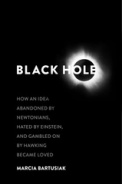
Marcia Bartusiak
Black Hole: How an Idea Abandoned by Newtonians, Hated by Einstein, and Gambled on by Hawking Became Loved
Yale University Press, 2015
For more than half a century, physicists and astronomers engaged in heated dispute over the possibility of black holes in the universe. Bartusiak shows how the black hole helped revive Einstein's greatest achievement, the general theory of relativity, after decades during which it had been pushed into the shadows. This book celebrates the hundredth anniversary of general relativity, uncovers how the black hole really got its name, and recounts the scientists' frustrating, exhilarating, and at times humorous battles over the acceptance of one of history's most dazzling ideas.
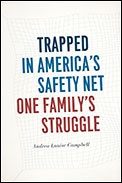
Andrea Louise Campbell
Trapped in America's Safety Net
University of Chicago Press, 2014
When Andrea Louise Campbell’s sister-in-law, Marcella Wagner, was run off the freeway by a hit-and-run driver, she was seven-and-a-half months pregnant. She survived—and, miraculously, the baby was born healthy. But that’s where the good news ends. Marcella was left paralyzed from the chest down. This accident was much more than just a physical and emotional tragedy. Like so many Americans—50 million, or one-sixth of the country’s population—neither Marcella nor her husband, Dave, who works for a small business, had health insurance. On the day of the accident, she was on her way to class for the nursing program through which she hoped to secure one of the few remaining jobs in the area with the promise of employer-provided insurance. Instead, the accident plunged the young family into the tangled web of means-tested social assistance.
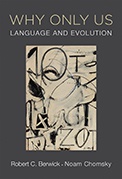
Why Only Us: Language and Evolution
by Noam Chomsky and Robert C. Berwick
The MIT Press, December 2015
We are born crying, but those cries signal the first stirring of language. Within a year or so, infants master the sound system of their language; a few years after that, they are engaging in conversations. This remarkable, species-specific ability to acquire any human language—“the language faculty”—raises important biological questions about language, including how it has evolved. This book by two distinguished scholars—a computer scientist and a linguist—addresses the enduring question of the evolution of language.
“Human language is a generative system that determines an infinite set of possible semantic objects,” says Noam Chomsky, Institute Professor and Professor of Linguistics Emeritus. “People don’t realize how uniform the human population is,” adds Robert C. Berwick, a computer scientist at the Laboratory for Information and Decision Systems. “We’re all very alike as humans, and this language capacity is incredibly uniform. If you take a baby from Southern Africa and put it in Beijing, they’ll speak Chinese.”
3 Questions with Chomsky and Berwick at MIT News
Noam Chomsky website
MIT Linguistics
Robert C. Berwick website
MIT Laboratory for Information and Decision Systems
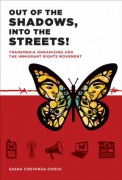
Sasha Costanza-Chock
Out of the Shadows, Into the Streets!
MIT Press, November 2014
Costanza-Chock enters into the debate of recent years about the role of new social-media platforms in abetting social and political change — a debate that precedes the Arab Spring uprisings of 2011, but was amplified by them. Some observers have viewed social media as an essential spark for these movements; skeptics have said such platforms fail to create the lasting connections needed to make social movements successful. But Costanza-Chock thinks asking whether social media can build powerful movements is the “wrong question.” Rather, he offers, it is important to look at all of a movement’s organizing activities.
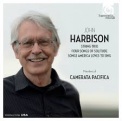
John Harbison
Camerata Pacifica
Harmonia Mundi USA, 2015
Camerata Pacifica is thrilled to present its first recording, released by Harmonia Mundi USA. This disc of chamber works by MIT Institute Professor John Harbison features the Camerata-commissioned String Trio and performances by Amy Schwartz Moretti, Paul Huang, Richard O'Neill, Ani Aznavoorian, Adrian Spence, Jose Franch- Ballester & Warren Jones.
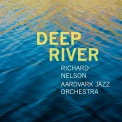
Mark Harvey
Deep River
Aardvark Jazz Orchestra
"Led by trumpeter-composer Mark Harvey, the Aardvark Jazz Orchestra is something of a miracle as well as a consistent joy. It has been performing brilliantly evocative, varied original music with a steady core of personnel for 43 years." Aardvark’s new disc, Deep River, a suite by the band’s longtime guitarist, Richard Nelson, re-imagines American roots themes.
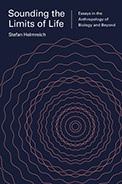
Stefan Helmreich
Sounding the Limits of Life
Princeton University Press, 2015
What is life? What is water? What is sound? In Sounding the Limits of Life, anthropologist Stefan Helmreich investigates how contemporary scientists—biologists, oceanographers, and audio engineers—are redefining these crucial concepts. Life, water, and sound are phenomena at once empirical and abstract, material and formal, scientific and social. In the age of synthetic biology, rising sea levels, and new technologies of listening, these phenomena stretch toward their conceptual snapping points, breaching the boundaries between the natural, cultural, and virtual.
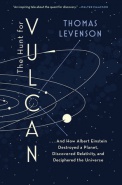
Thomas Levenson
The Hunt for Vulcan …and How Einstein Destroyed a Planet, Discovered Relativity, and Deciphered the Universe
Penguin / Random House November 2015
For more than fifty years, the world’s top scientists searched for the “missing” planet Vulcan, whose existence was mandated by Isaac Newton’s theories of gravity. Countless hours were spent on the hunt for the elusive orb, and some of the era’s most skilled astronomers even claimed to have found it. There was just one problem: It was never there.
In The Hunt for Vulcan, Thomas Levenson follows the visionary scientists who inhabit the story of the phantom planet. It took Albert Einstein to discern that the mystery of the missing planet was a problem not of measurements or math but of Newton’s theory of gravity itself.
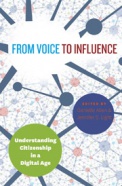
Jennifer Light
From Voice to Influence: Understanding Citizenship in a Digital Age
University of Chicago Press, 2015
"[O]ur conversations about new media and politics are proceeding in a manner that’s technologically determinist, assuming political change will follow from technological change, when in fact, the political changes are contingent on how we regulate the technology, how much it costs, etc.... When students have the historical distance to compare technologies’ short- and long-term effects, to contrast fantasy with reality — they see how more than just better technology is needed for innovations to have particular social or political outcomes."

Persona
Chamber opera adaptation of Ingmar Bergman’s classic film
World Premiere Performance. October 23/24, 2015
National Sawdust Festival, Brooklyn, NY
Directed by Jay Scheib | Music Direction by Evan Ziporyn
About
"Ingmar Bergman’s 'Persona' is regarded as a classic of 20th-century cinema, a powerful and enigmatic exploration of the human psyche in turmoil. Now, thanks to MIT theater director Jay Scheib and MIT composer Keeril Makan, here comes 'Persona,' the opera." Full story at MIT News
"Music comes first in any opera, and Mr. Makan’s 85-minute score, roughly as long as the film, compellingly drives the drama in 'Persona.' Mr. Makan sets the text with striking sensitivity to when a moment demands conversational naturalness or supple lyricism [and his] acute ear for harmony and eerie textures draw you in continually." Full review at The New York Times
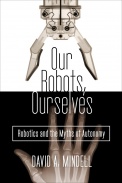
David Mindell
Our Robots, Ourselves: Robotics and the Myths of Autonomy
Viking Books, 2015
Drawing on firsthand experience, extensive interviews, and the latest research from MIT and elsewhere, Mindell takes us to extreme environments—high atmosphere, deep ocean, and outer space—to reveal where the most advanced robotics already exist. He argues that the stark lines we’ve drawn between human and not human, manual and automated, aren’t helpful for understanding our relationship with robotics.
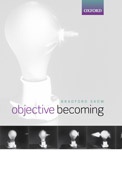
Brad Skow
Objective Becoming
Oxford University Press, January 2015
What does the passage of time consist in? There are some suggestive metaphors. "Events approach us, pass us, and recede from us, like sticks and leaves floating on the river of time." "We are moving from the past into the future, like ships sailing into an unknown ocean." There is surely something right and deep about these metaphors. But how close are they to the literal truth? In this book Bradford Skow argues that they are far from the literal truth. Skow's argument takes the form of a defense of the block universe theory of time, a theory that, in many ways, treats time as a dimension of reality that closely resembles the three dimensions of space.
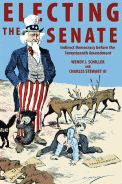
Wendy J. Schiller & Charles Stewart III
Electing the Senate: Indirect Democracy before the Seventeenth Amendment
Princeton University Press, 2015
From 1789 to 1913, the Constitution mandated that United States senators be chosen by state legislators. But in 1913 the Seventeenth Amendment to the Constitution was ratified, giving the public a direct vote. Electing the Senate investigates the electoral connections among constituents, state legislators, political parties, and U.S. senators during the age of indirect elections. Schiller and Stewart find that even though parties controlled the partisan affiliation of the winning candidate for Senate, they had much less control over the universe of candidates who competed for votes in Senate elections and the parties did not always succeed in resolving internal conflict among their rank and file.
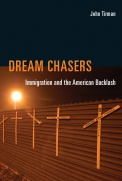
John Tirman
Dream Chasers: Immigration and the American Backlash
MIT Press, 2015
Illegal immigration continues to roil American politics. Yet polls show that a majority of Americans support some kind of path to citizenship for those here illegally. What is going on? In this book, John Tirman shows how the resistance to immigration in America is more cultural than political. Although cloaked in language about jobs and secure borders, the cultural resistance to immigration expresses a fear that immigrants are changing the dominant white, Protestant, “real American” culture.
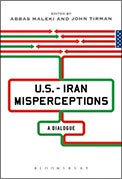
John Tirman (ed.)
with Abbas Maleki
U.S.-Iran Misperceptions: A Dialogue
Bloomsbury Publishing, 2014
Can Iranians and Americans find common ground to overcome their troubled history? U.S.-Iran Misperceptions is the first written dialogue on the key issues that separate these two great countries. Bringing together former policy makers and international relations experts from the United States and Iran, U.S.-Iran Misperceptions: A Dialogue provides new insights into and arguments about how each country's elites view the other, and how misperceptions have blocked the two from forging a normal and productive relationship.
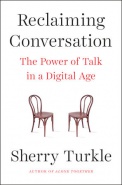
Sherry Turkle
Reclaiming Conversation: The Power of Talk in a Digital Age
Penguin Press / Random House October 2015
We live in a technological universe in which we are always communicating. And yet we have sacrificed conversation for mere connection. Turkle investigates how a flight from conversation undermines our relationships, creativity, and productivity—and why reclaiming face-to-face conversation can help us regain lost ground.
Long an enthusiast for the possibilities of digital culture, here Turkle investigates a troubling consequence: at work, at home, in politics, and in love, we find ways around conversation, tempted by the possibilities of a text or an email in which we don’t have to look, listen, or reveal ourselves. We develop a taste for what mere connection offers. But there is good news: we are resilient, and Turkle has ideas about how to reclaim face-to-face conversation, which she says, "is the most human and humanizing thing that we do."

Christine Walley
Exit Zero: Documentary
2015
Exit Zero is a feature-length documentary film that tells a personal story of the lasting social and environmental impacts of “deindustrialization” and the key role it has played in expanding class inequalities in the United States. Interweaving home movies, found footage, and a first person narrative, the film traces the stories of multiple generations of writer/producer Christine Walley’s family in the once-thriving steel mill community of Southeast Chicago. From the turn-of-the-century experience of immigrants who worked in Chicago’s mammoth industries to the labor struggles of the 1930s to the seemingly unfathomable closure of the steel mills in the 1980s and 90s, these family stories convey a history that serves as a microcosm of the broader national experience of deindustrialization and its economic and environmental aftermath.
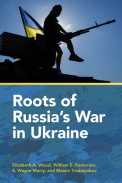
Elizabeth Wood
with William E. Pomeranz, E. Wayne Merry, and Maxim Trudolyubov
Roots of Russia's War in Ukraine
Woodrow Wilson Center Press with Columbia University Press, 2015
Roots of Russia’s War in Ukraine presents four perspectives on the origins of the ongoing war in Ukraine that began in February 2014, concentrating on Russian motivations and intentions. What propelled Russia to send troops into Crimea and then declare that Crimea had formally chosen to “join” Russia? Why did the conflict spread to eastern Ukraine? What does the crisis say about Russian priorities? The exploration of these and other questions gives historians, political watchers, and theorists a solid grasp of the events that have destabilized the region.